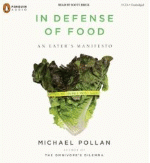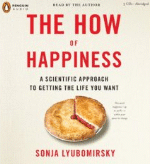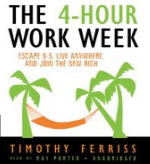January 2008
THE LOWE DOWN ON AUDIOBOOKS
by Jonathan Lowe
Every year, it seems, we feel the need to make New Year's
resolutions. Whether we succeed in sticking to them is a matter
of motivation and tenacity. To aid such attempts at self improvement
I've chosen several new releases for their unique perspectives and/or
scientific rigor. They are especially practical when heard on audio,
while stuck in traffic and passing all those fast food restaurant
signs, or while being tailgated by frustrated shoppers returning
presents that didn't quite make them as happy as they expected.
 First
up is a book that turns the head on our modern western diet
IN DEFENSE OF FOOD by Michael Pollan poses
the argument that the reason why we're getting fatter and
more unhealthy every year is because big food processors
make more profit selling grains than leaves. That is, whole
foods spoil easily, while denatured and milled grains have
a long shelf life, and can be transported long distances
easier. The most profitable grains are corn and soybeans,
which has led to the near extinction of many more nutrient-dense
crops. Since the most healthy parts of grains spoil fastest,
these are milled out, leaving a bleached "fake"
food behind, which is then "enriched" with a chemical
spray, and introduced with other potentially hazardous chemicals
to preserve freshness. Empty calories and added sugars then
lead to a host of diseases over time, including diabetes,
heart disease and cancer. Particularly disturbing is the
rise in consumption of high fructose corn syrup, present
in most non-diet sodas and juices, and many cookies, cakes,
and other snacks. It is an unnatural (manmade) but cheap
sweetener that is difficult to digest, just as trans-fats
are, and is being guzzled by Americans like there's no tomorrow.
Those doing the guzzling had better hope there's no tomorrow,
too, because their savings on food costs over buying whole
foods will translate into their spending far more on drugs
and health care in the future! Narrated by Scott Brick,
who takes a dramatic approach to the eye-opening text, the
audiobook also dispenses sound advice, including limiting
your purchases to those items near the walls of supermarkets,
since highly processed "fake" First
up is a book that turns the head on our modern western diet
IN DEFENSE OF FOOD by Michael Pollan poses
the argument that the reason why we're getting fatter and
more unhealthy every year is because big food processors
make more profit selling grains than leaves. That is, whole
foods spoil easily, while denatured and milled grains have
a long shelf life, and can be transported long distances
easier. The most profitable grains are corn and soybeans,
which has led to the near extinction of many more nutrient-dense
crops. Since the most healthy parts of grains spoil fastest,
these are milled out, leaving a bleached "fake"
food behind, which is then "enriched" with a chemical
spray, and introduced with other potentially hazardous chemicals
to preserve freshness. Empty calories and added sugars then
lead to a host of diseases over time, including diabetes,
heart disease and cancer. Particularly disturbing is the
rise in consumption of high fructose corn syrup, present
in most non-diet sodas and juices, and many cookies, cakes,
and other snacks. It is an unnatural (manmade) but cheap
sweetener that is difficult to digest, just as trans-fats
are, and is being guzzled by Americans like there's no tomorrow.
Those doing the guzzling had better hope there's no tomorrow,
too, because their savings on food costs over buying whole
foods will translate into their spending far more on drugs
and health care in the future! Narrated by Scott Brick,
who takes a dramatic approach to the eye-opening text, the
audiobook also dispenses sound advice, including limiting
your purchases to those items near the walls of supermarkets,
since highly processed "fake"
foods tend to line the center aisles. If you take just this
advice, you'll lose weigh, outlive your classmates, and
may decide to petition your Congressman to declare war on
the food industry lobby as well. (Penguin Audio; 6 1/2
hours unabridged) |
 A
year of so ago I published a novel about longevity science,
so naturally I was interested in hearing what Michael F.
Roizen and Mehmet C. Oz had to say about the subject in
YOU STAYING YOUNG--The Owner's Manual
for Extending Your Warranty. Dr. Oz is Oprah's doctor,
but both men narrate this interesting and comprehensive
examination of what causes aging, and how to slow down the
process. Some of it relates to things mentioned in the previous
book, but here, as told by medical doctors, we see deeper
into the science of aging, not just those risk factors most
people already know about--smoking, processed foods, saturated
fat, sedentary lifestyles, etc. For instance, did you know
there's a relationship between flossing and heart disease?
Or that sunburn triggers the stem cells grown in your bones
to migrate to the burn to repair it, and so if you burn
often the odds for a genetic mistake increases, resulting
in cancer? Every eight years the body's aging rate gets
on a faster treadmill, and the trick is to fool your internal
pedometer by minimizing the biological processes that propel
it graveward. Avoiding stress--both internal and external--is
most important here, since tension and toxins have a direct
effect on the cells, turning off and on various genes that
regulate their life cycle. Think of tension as anger, frustration,
worry and regret, and toxins as tail pipe exhaust, loud
noises, and even those greasy, salty french fries you just
ate. You can't make up for thirty years of eating holiday
cheese balls by popping a vitamin pill, but you can start
reversing the aging process, say the authors, by thinking
about what you're doing instead of doing it automatically.
Popping an aspirin a day and drinking one glass of red wine
in the evening may help too, surprisingly. As long as that's
all the alcohol you're drinking, and you avoid soda altogether.
(Simon & Schuster Audio; 5 hours abridged) A
year of so ago I published a novel about longevity science,
so naturally I was interested in hearing what Michael F.
Roizen and Mehmet C. Oz had to say about the subject in
YOU STAYING YOUNG--The Owner's Manual
for Extending Your Warranty. Dr. Oz is Oprah's doctor,
but both men narrate this interesting and comprehensive
examination of what causes aging, and how to slow down the
process. Some of it relates to things mentioned in the previous
book, but here, as told by medical doctors, we see deeper
into the science of aging, not just those risk factors most
people already know about--smoking, processed foods, saturated
fat, sedentary lifestyles, etc. For instance, did you know
there's a relationship between flossing and heart disease?
Or that sunburn triggers the stem cells grown in your bones
to migrate to the burn to repair it, and so if you burn
often the odds for a genetic mistake increases, resulting
in cancer? Every eight years the body's aging rate gets
on a faster treadmill, and the trick is to fool your internal
pedometer by minimizing the biological processes that propel
it graveward. Avoiding stress--both internal and external--is
most important here, since tension and toxins have a direct
effect on the cells, turning off and on various genes that
regulate their life cycle. Think of tension as anger, frustration,
worry and regret, and toxins as tail pipe exhaust, loud
noises, and even those greasy, salty french fries you just
ate. You can't make up for thirty years of eating holiday
cheese balls by popping a vitamin pill, but you can start
reversing the aging process, say the authors, by thinking
about what you're doing instead of doing it automatically.
Popping an aspirin a day and drinking one glass of red wine
in the evening may help too, surprisingly. As long as that's
all the alcohol you're drinking, and you avoid soda altogether.
(Simon & Schuster Audio; 5 hours abridged) |
 Next,
in THE HOW OF HAPPINESS--A Scientific
Approach to Getting the Life You Want, author Sonja
Lyubomirsky reveals evidence that happiness is 60% a matter
of genetic predisposition, and 40% a conditioned response.
No doubt you've met people who are happy by nature, and
who therefore possess a cushion against the effects of
bad things happening in their lives. For the rest of us,
without this high set point for happiness, there is the
remaining 40% to be manipulated. One of the ways, surprisingly,
is simply smiling, even when things may be going wrong.
Studies have shown that moods become elevated just by
mimicking happy people, or pretending to be happy. Read
by the author, the audiobook walks through case studies
which demonstrate that money, love, fame, and outward
success have little to do with happiness, which is more
about an outlook and state of mind than a quantifiable
list of causes. Feeling alive and having a relationship
to that life which makes it an adventure is far more important
than driving a new Mercedes or having a big bank account.
(Penguin Audio; 6 hours abridged) Next,
in THE HOW OF HAPPINESS--A Scientific
Approach to Getting the Life You Want, author Sonja
Lyubomirsky reveals evidence that happiness is 60% a matter
of genetic predisposition, and 40% a conditioned response.
No doubt you've met people who are happy by nature, and
who therefore possess a cushion against the effects of
bad things happening in their lives. For the rest of us,
without this high set point for happiness, there is the
remaining 40% to be manipulated. One of the ways, surprisingly,
is simply smiling, even when things may be going wrong.
Studies have shown that moods become elevated just by
mimicking happy people, or pretending to be happy. Read
by the author, the audiobook walks through case studies
which demonstrate that money, love, fame, and outward
success have little to do with happiness, which is more
about an outlook and state of mind than a quantifiable
list of causes. Feeling alive and having a relationship
to that life which makes it an adventure is far more important
than driving a new Mercedes or having a big bank account.
(Penguin Audio; 6 hours abridged)
|
 The
idea of breaking free from myths regarding happiness iscontinued
in THE ULTIMATE CHEAPSKATE'S ROAD MAP TO TRUE
RICHES by Jeff Yeager. Here is a man who cares
not a wit about designer labels, $4 cups of coffee, or
showing off some new gas-guzzling luxury car to friends
and neighbors. His primary mode of transport is a bicycle,
which keeps him healthier while sparing the air. Yeager
advocates living within your means at age thirty, and
staying there for life, rather than trading up continuously
until hospital bills take what's left. In addition to
his many tips for conserving rather than spending on everyday
items, he recommends pinching dollars more of pennies,
since big ticket items are what most weigh people down.
Keep everything else in perspective, and you can really
enjoy life more while spending less. According to Yeager,
who also reads the audiobook, once you step off the treadmill
of "more is better" you'll discover that less
means less stress, too. (Brilliance Audio; 8 hours
unabidged) The
idea of breaking free from myths regarding happiness iscontinued
in THE ULTIMATE CHEAPSKATE'S ROAD MAP TO TRUE
RICHES by Jeff Yeager. Here is a man who cares
not a wit about designer labels, $4 cups of coffee, or
showing off some new gas-guzzling luxury car to friends
and neighbors. His primary mode of transport is a bicycle,
which keeps him healthier while sparing the air. Yeager
advocates living within your means at age thirty, and
staying there for life, rather than trading up continuously
until hospital bills take what's left. In addition to
his many tips for conserving rather than spending on everyday
items, he recommends pinching dollars more of pennies,
since big ticket items are what most weigh people down.
Keep everything else in perspective, and you can really
enjoy life more while spending less. According to Yeager,
who also reads the audiobook, once you step off the treadmill
of "more is better" you'll discover that less
means less stress, too. (Brilliance Audio; 8 hours
unabidged)
|
 Finally,
we come to a true revolutionary. Timothy Ferriss is author
of THE FOUR HOUR WORK WEEK--Escape
9 to 5, Live Anywhere, and Join the New Rich. Ferris
turned his early dislike of authority into a career by
rejecting the established model of deferring life until
retirement while "wasting" your prime years
in a dead end job. Having designed his own escape from
drudgery, Ferriss now sells sports medicines online, and
travels the world on the income, while still in his 30s.
His purchases, sales, and inventory are all outsourced,
so there's no management attention needed, either. And
he suggests that listeners can copy what he did by planing
month-long "mini-vacations" to do what they
really love, and then see if there's a way to continue
it. If not, he suggests going back to the office cubical
to come up with a new plan. It worked for him, after all.
Formerly stuck in a job he despised, making $40G a year,
Ferriss now makes $40G a month while living outside the
U.S. for 11 months of the year in major world capitals.
(Far less expensive than people suppose, he claims.) Utilizing
his opportunistic talent for seeing ways to bend the rules,
he also won a dance competition in Brazil, and a kickboxing
championship in Japan as well. But can anyone follow in
his footsteps? Perhaps, but only if they share the same
mindset. Self driven and innovative, Ferriss is a rare
breed. He doesn't need or desire either the admiration
of others, nor their symbols of wealth. He certainly cares
not at all for the treadmill lifestyle which characterizes
most everyone's experience, watching TV and mimicking
their neighbors. "Why retire at all?" Ferriss
asks, "if you're doing what you love? Besides, in
the traditional retirement you'll be so bored you'll want
to stick bicycle spokes in your eyes." (Audible.com
download to iPod; 8 hours unabridged) Finally,
we come to a true revolutionary. Timothy Ferriss is author
of THE FOUR HOUR WORK WEEK--Escape
9 to 5, Live Anywhere, and Join the New Rich. Ferris
turned his early dislike of authority into a career by
rejecting the established model of deferring life until
retirement while "wasting" your prime years
in a dead end job. Having designed his own escape from
drudgery, Ferriss now sells sports medicines online, and
travels the world on the income, while still in his 30s.
His purchases, sales, and inventory are all outsourced,
so there's no management attention needed, either. And
he suggests that listeners can copy what he did by planing
month-long "mini-vacations" to do what they
really love, and then see if there's a way to continue
it. If not, he suggests going back to the office cubical
to come up with a new plan. It worked for him, after all.
Formerly stuck in a job he despised, making $40G a year,
Ferriss now makes $40G a month while living outside the
U.S. for 11 months of the year in major world capitals.
(Far less expensive than people suppose, he claims.) Utilizing
his opportunistic talent for seeing ways to bend the rules,
he also won a dance competition in Brazil, and a kickboxing
championship in Japan as well. But can anyone follow in
his footsteps? Perhaps, but only if they share the same
mindset. Self driven and innovative, Ferriss is a rare
breed. He doesn't need or desire either the admiration
of others, nor their symbols of wealth. He certainly cares
not at all for the treadmill lifestyle which characterizes
most everyone's experience, watching TV and mimicking
their neighbors. "Why retire at all?" Ferriss
asks, "if you're doing what you love? Besides, in
the traditional retirement you'll be so bored you'll want
to stick bicycle spokes in your eyes." (Audible.com
download to iPod; 8 hours unabridged)
|
|